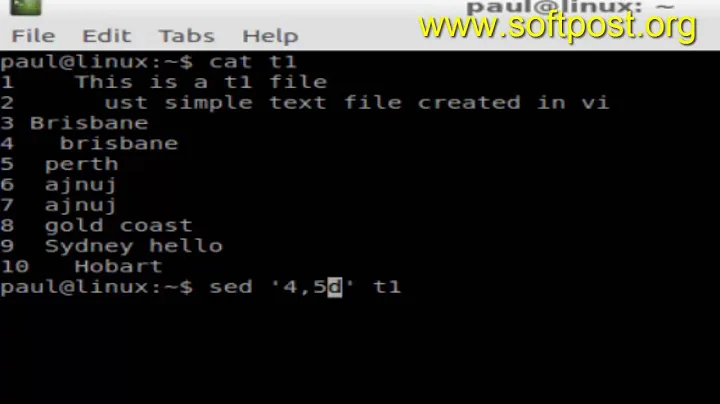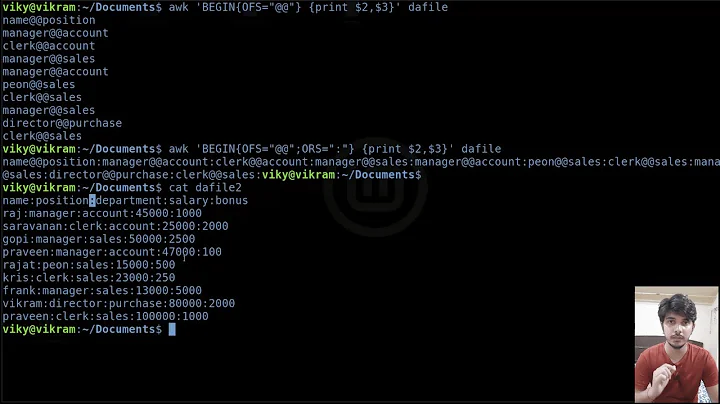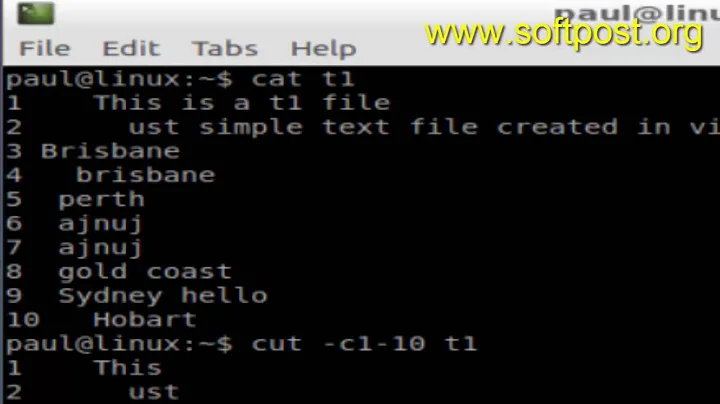awk - How to print the number of characters for the first n lines in a file?
8,632
Solution 1
Tell awk to quit when enough lines have been read:
awk '$0 = length; NR==3 { exit }' /etc/passwd
Note that this solution ignores empty lines, although not for the line count.
Solution 2
A direct Awk version (not so efficient as @Thor's), but slightly more clear:
awk 'NR <= 3 {print length}' /etc/passwd
Solution 3
You can execute it with awk only command, as nicely described by @Thor, and @JJoao (+1 from me)
You can combine awk and head with parameter -n follows by the number of lines as described below:
Thanks for @Maerlyn suggestion to execute in this order: head | awk
e.g. You will get the first 3 lines using:
head -n3 /etc/passwd | awk '{ print length($0); }'
-n, --lines=[-]K
print the first K lines instead of the first 10; with the leading '-', print all but the last K lines of each file
Related videos on Youtube
Author by
bambosze_babuni
Updated on September 18, 2022Comments
-
bambosze_babuni over 1 year
I have a command:
$ awk '{ print length($0); }' /etc/passwdIt prints number of characters of every line in a passwd file:
52 52 61 48 81 58 etc.How can I print the number of characters for only the first n lines?
For example - for the first 3 lines it would give something like:
52 52 61-
njzk2 about 7 years@ilkkachu true.
-
 VIPIN KUMAR about 7 yearsIf you want to ignore blank like then use below -
VIPIN KUMAR about 7 yearsIf you want to ignore blank like then use below -awk '(NR<=line) && length($0) {print length($0)}' line=3 file
-
-
 Yaron about 7 years@msjavx86 - great :) please accept the answer, when you'll be able to do it
Yaron about 7 years@msjavx86 - great :) please accept the answer, when you'll be able to do it -
bambosze_babuni about 7 yearsof course I will - in about 10 minutes ;) thanks again!
-
 Admin about 7 yearstricky and cool! (+1)
Admin about 7 yearstricky and cool! (+1) -
Maerlyn about 7 yearsMaybe even reverse,
head -n3 /etc/passwd | awkso awk doesn't have to process the whole file. -
 ilkkachu about 7 yearsIf any or the lines is empty, the assignment evaluates to zero (a falsy value), and the length will not be printed.
ilkkachu about 7 yearsIf any or the lines is empty, the assignment evaluates to zero (a falsy value), and the length will not be printed. -
 Dennis Williamson about 7 yearsIf this was
Dennis Williamson about 7 yearsIf this wasawk '{ print length } NR>=3 { exit }' /etc/passwd, I'd upvote it. -
 Dennis Williamson about 7 yearsAWK can count lines, no need for
Dennis Williamson about 7 yearsAWK can count lines, no need forhead. -
 Admin about 7 years@DennisWilliamson, thank you. That is a very good suggestion, I will not include it in my answer because it is already implicit in Thor's proposal.
Admin about 7 years@DennisWilliamson, thank you. That is a very good suggestion, I will not include it in my answer because it is already implicit in Thor's proposal. -
Thor about 7 years@ilkkachu: Depending on the situation, it would be reasonable to ignore empty lines. I have added a note about this.
-
 Yaron about 7 years@DennisWilliamson - thanks for the comment, using
Yaron about 7 years@DennisWilliamson - thanks for the comment, usingheadwas the first working solution which came to my mind. I've upvoted @Thor, @JJoao answer which usesawkonly solution.







